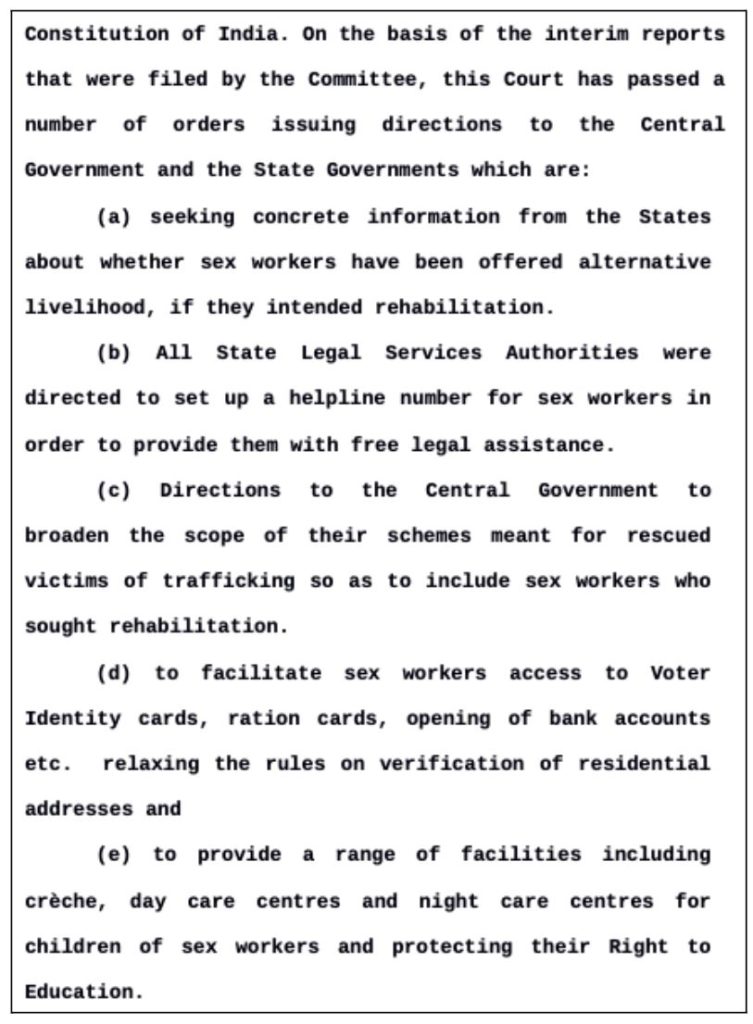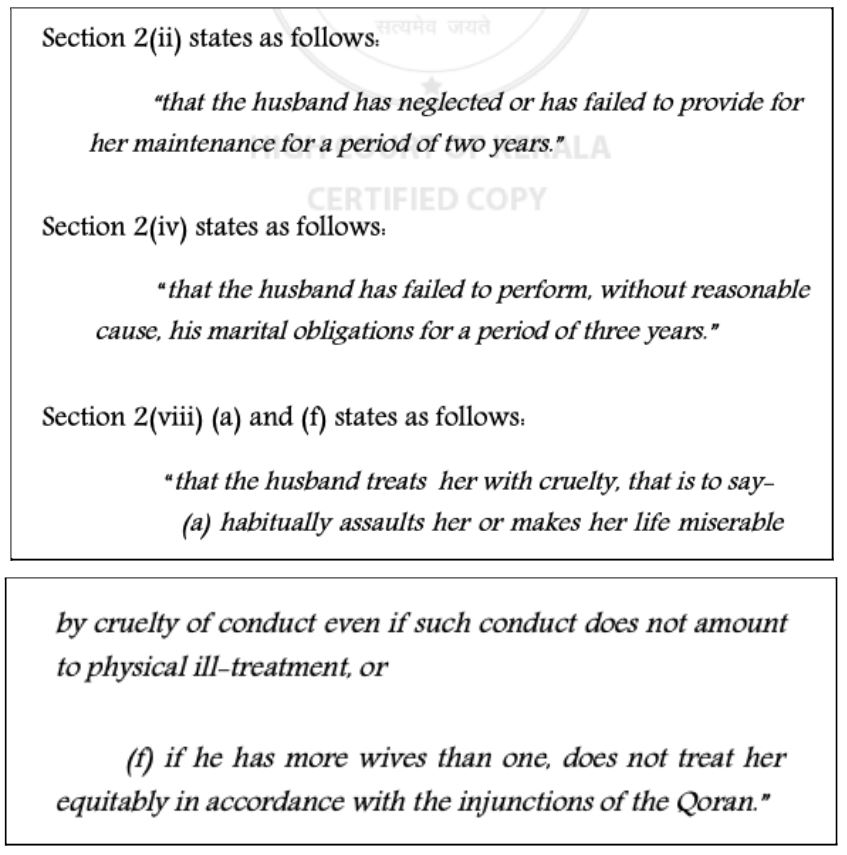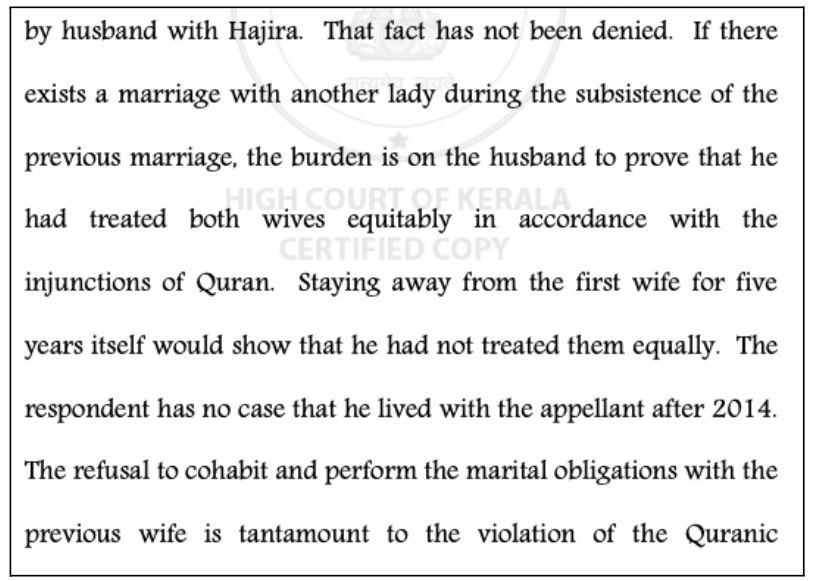In this roundup of court judgements, we look at Constitutional Courts’ remarks & directions about the issuance of ration cards and voter IDs to sex workers, status reports filed by States for ex-gratia payment to COVID-19 victim families, UP government policy on providing compensation to the family members of UP Panchayat polls workers, and unequal treatment of wives as a valid ground for divorce for Muslim Women.
Supreme Court: Directs Issuance of Ration Cards, Voter IDs to Sex Workers
In the case of Budhadev Karmaskar vs. State of West Bengal, the Supreme Court directed the State Governments and Union Territories to immediately commence the process of issuance of ration cards/voters identity cards to sex workers, as per the list that is maintained by NACO (National AIDS Control Organisation).
Almost a decade back, on 19 July 2011, a committee was appointed by the Supreme Court to advise on issues relating to the prevention of trafficking, rehabilitation of sex workers (who wish to quit sex work) and the conditions conducive for sex workers to live with dignity in accordance with Article 21. On the basis of the Committee’s reports, the apex court passed several orders issuing directions to Central Government and the State Governments, including facilitation of sex workers’ access to voter identity cards, ration cards, etc.

The submissions by the Committee indicated that it is very difficult for sex workers to acquire proof of identity cards such as ration cards or voters identity cards owing to the lack of proof of residence. Resultantly, they are denied access to the schemes meant for rehabilitation and welfare.
Further, during the COVID-19 lockdowns, it was directed the States and Union Territories to continue the distribution of dry rations to sex workers without insisting on ration cards and other proof of residence and profession.
The bench of Justices LN Rao, BR Gavai and BV Nagarathna noted that these directions to provide sex workers with ration cards & voter identity cards almost a decade back were not complied with. It was also submitted that dry ration was distributed for a few months and thereafter stopped.
In the light of this, the bench directed the following:
- States/UTs to immediately commence the process of issuance of ration cards/voters identity cards to sex workers.
- States to take assistance from State AIDS Control Societies, who were directed to prepare a list of sex workers after verifying with community-based organizations.
- States/UTs to continue the distribution of dry rations to sex workers without insisting on ration cards and other proof of residence and profession by following the procedure.
Directions were also issued to file state/UT-wise status reports relating to the issuance of ration cards, voters identity cards and Aadhar cards within a period of four weeks from the date of order and keep the name of the sex workers confidential.
Supreme Court: Reviewed status reports filed by States for ex gratia payment to a family member of a person who died due to COVID-19.
In the case Gaurav Kumar Bansal vs. Union of India, the Supreme Court reviewed status reports filed by states and issued further directions for paying compensation/ex-gratia to the claimants/ family member of the person who has died due to COVID-19.
In pursuance of the apex court’s earlier orders, a status report with particulars was filed by 10 States, namely, Andhra Pradesh, Assam, Bihar, Gujarat, Jammu and Kashmir, Madhya Pradesh, Punjab, West Bengal, Rajasthan and Tamil Nadu.
For Andhra Pradesh, against 14,471 deaths officially recorded, approximately 36,205 claims have been received. Against 36,205 claims received, the State has paid compensation/ex gratia to 11,464 claimants only.
For Gujarat, against 10,094 recorded deaths, the State has received 40,467 claims out of which 26,836 claimants have been paid. The compensation/ex-gratia to the remaining claimants is to be paid within a period of one week from the date of the order.
For Punjab, even though 16,234 deaths were registered, only 5,431 claims have been received and only 2,840 claimants have been paid the compensation.
For West Bengal, against 19,630 registered deaths, payments have been made only to 3,355 claimants. However, the applications received were very less i.e., 5,445.
For Tamil Nadu, against 36,481 registered deaths, the State received 31,850 claims. Payments have been made to the 17,448 claimants and the remaining claimants are to receive the payment within a period of one week from the date of the order.
For Maharashtra, against the total registered deaths of 1,41,025, approximately 8,000 claimants have received the payment. The payment to the remaining claimants/family member is to be made within a period of one week from the date of the order.
For Kerala, against the total registered deaths of 40,855, about 10,778 claim forms have been received and actual payment has been made to only 548 claimants.
In light of this, the apex court issued the following directions.
- The Directed States to complete the process and make the actual payment of compensation/ex-gratia to the remaining claimants within a period of one week.
- Directed the State to give wide publicity to the COVID-19 compensation scheme within a period of one week. This includes advertisement in local newspapers with wide circulation and in vernacular language, containing all details with respect to the application format, submission portal, and the Grievance Redressal Committees constituted in each district.
States like Rajasthan, Assam and Telangana did not furnish similar information during the hearing. However, they informed the apex court that the process to pay the claimants was ongoing and they will follow the instructions accordingly. They have been granted time till the next hearing to submit information on the number of claims and payments made.
Other states like Delhi, Karnataka, Chhattisgarh, and others have not filed status reports on the number of COVID-19 registered deaths, claims received, and claims sanctioned/paid.
Allahabad HC: Revisit the policy to compensate family members only if COVID-19 death occurred within 30 days.
In the case Kusum Lata Yadav vs. the State Of U.P., the Allahabad high court directed the Uttar Pradesh Government to revisit its policy to provide compensation to the family members of UP Panchayat polls workers who died within 30 days of contracting COVID-19 while on duty.
The high court was hearing a petition filed by Kusum Lata Yadav, regarding the compensation for the death of her husband (a UP panchayat poll worker) due to contracting COVID-19. The compensation payment was being denied to her because of the ceiling contained in Clause 12 of the Government Order (dated June 2021), which restricts payment of compensation only if the death has occurred within 30 days.
The bench of Justice Ashwani Kumar Mishra and Justice Vikram D. Chauhan observed that the restriction of death within 30 days of COVID-19, contained in Clause 12 of the Government Order (dated June 2021), does not appear to be based on any rational classification. Therefore, the authorities were asked to re-visit the issue.
In conclusion, the high court sought a counter-affidavit from the UP Government regarding the above observation by an officer not below the rank of Special Secretary, within six weeks. The matter has been posted for further hearing on 17 February 2022.
Kerala HC: Unequal treatment of wives a valid ground for divorce for Muslim Women.
In the case Ramla vs. Abdul Rahuf, the Kerala High Court ruled that the refusal of a Muslim man to perform his marital obligations to his first wife after a second marriage is a valid ground for divorce.
The high court was hearing an appeal filed by a Muslim woman aggrieved by an order of a Family Court which denied her a decree of divorce. During his time abroad, the petitioner’s husband contracted a marriage with another woman. She filed for divorce on the grounds under Sections 2(ii), 2(iv) and 2(viii) of the Dissolution of Muslim Marriages Act, 1939.

The Family Court dismissed the petition as the appellant’s wife failed to make out a case under Sections 2(ii), 2(iv) and 2(viii) (f) of the Act.
The high court noted that while there was evidence of maintenance being provided on certain occasions, the Family Court carried on with the assumption that providing maintenance is sufficient to prove that the husband performed marital obligations.
The bench of Justice A. Muhamed Mustaque and Justice Sophy Thomas held that staying away from the first wife for five years itself shows that the husband has not treated the wives equally.

The high court emphasized that refusal to cohabit and perform marital obligations with the previous wife is tantamount to the violation of the Quranic injunctions (as also highlighted in 2(viii) (f) of the Act).
In conclusion, the high court found this to be a valid ground for divorce to be granted. The appeal was thereby allowed, and the trial court decision was set aside.
Featured Image: Important Court Judgements


